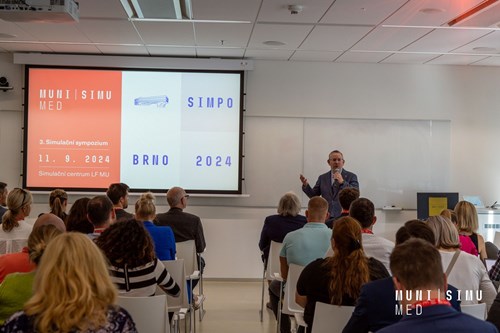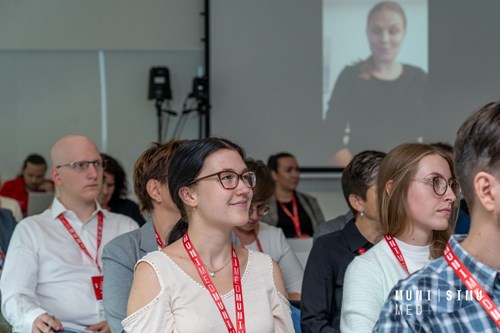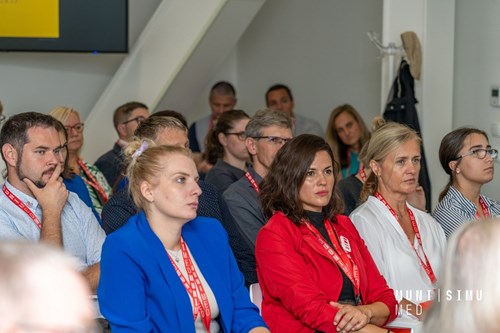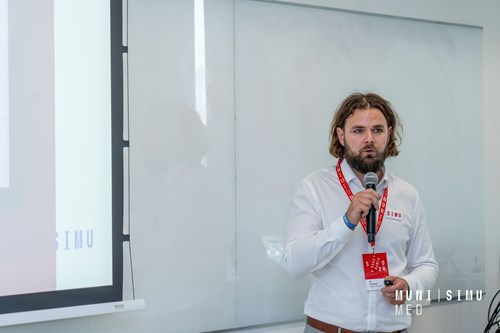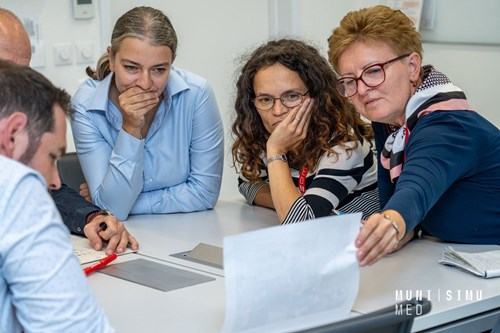Experts on simulation in medicine from all over the country and abroad gathered at the Faculty of Medicine of Masaryk University. To discuss current trends and share experiences. The third edition of the SIMPO simulation symposium was held at SIMU. Of course, our experts could not be absent, although some of them joined at least remotely. "Simulation is becoming more and more important in medical education," pointed out Dr Tamara Skříšovská, the first ever graduate of the PhD programme in Simulation in Medicine at the Faculty of Medicine MU and since last year also the vice-president of SESAM, the European Society for Simulation in Medicine, in her video message, which arrived in Brno from Toronto, Canada.
After the welcoming speeches, the floor was given to this year's keynote speakers, who flew in from London -Jason A. Lawson from the Royal Imperial College of Science, Technology and Medicine and Lesley Bromley, an anaesthesiology and education specialist, from University College London. In his half-hour lecture, Dr Lawson presented his experience of using mixed, augmented and pure virtual reality in medical education, pointing out an interesting fact in addition to the obvious advantages of using these technologies, such as the possibility of remote collaboration. "We have found that the use of these technologies makes medics more confident, and as a result, they make far fewer mistakes," he intrigued the audience with one of his findings. Dr. Bromley's talk, The Neuroscience of Being an Effective Instructor, then uncovered the biological processes of learning and how to use them in teaching. Both then expanded on their insights in workshops, which were already welcomed as a complementary lecture format at last year's SIMPO.
Dr. David Peřan from the 3rd Faculty of Medicine of Charles University reminded us that simulation in medicine is not self-sustaining it has its pitfalls and as such it needs to be systematically approached. He was joined in the morning block of lectures by "our own" - Dr. Tereza Vafková with practical advice on how to work effectively with feedback from teaching, and engineer Jiří Travěnec, who introduced the attendees to the Workplan event management platform developed especially for the MU Faculty of Medicine Simulation Centre, which, judging by the audience's reactions, would find use at other workplaces as well. In a similar lecture spirit was the afternoon programme, in which two presentations were devoted to team-based learning, and the final block before the attendees went on tours of the simulation centre, was composed of a series of shorter lectures.
As it was stated in the introduction of the symposium, one of its purposes is to "take simulation in medicine a step further, even though we have nothing to be ashamed of in the Czech Republic today" through a joint meeting of experts in the ever-developing field. Simulation in medicine is developing rapidly, so we will meet again next year at SIMU under the SIMPO banner. As the head of the Institute of Simulation Medicine, Professor Petr Štourač, pointed out, this will be the fourth meeting, but it will also be partly semi-circular. Next year, the MU Faculty of Medicine Simulation Centre will commemorate five years since its opening...



